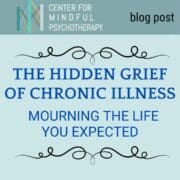
When we think of grief, we often associate it with the loss of a loved one. But grief isn’t limited to death—it can also arise from the loss of a life we imagined for ourselves. For those living with chronic illness, this type of grief is deeply personal, yet often invisible to others. It’s the quiet mourning of missed opportunities, shifting identities, and the realization that life may never look the way you once expected.
Find a therapist specializing in chronic illness in our therapist directory or contact us to book an appointment with one of our many therapists.
What Is Chronic Illness Grief?
Chronic illness grief is the emotional response to the losses that come with long-term health conditions. These losses can be physical, social, professional, or even deeply internal. They often accumulate over time, making grief an ongoing, nonlinear experience. Unlike a singular loss, chronic illness grief tends to resurface—when symptoms worsen, when another treatment fails, or when a new limitation emerges.
Some of the most common aspects of life that people with chronic illness grieve include:
- Physical Abilities – The loss of strength, endurance, or mobility.
- Career Aspirations – Having to scale back or abandon professional goals.
- Independence – Relying more on others for daily tasks or medical care.
- Social Life – Missing out on events, friendships shifting, or feeling isolated.
- Sense of Identity – Feeling disconnected from the person you once were.
- Certainty About the Future – The unpredictability of symptoms disrupting life plans.
This grief is complicated by the fact that chronic illness is ongoing. There’s no closure, no final goodbye—just the need to keep adjusting and finding new ways to live within your body’s limitations.
Why This Grief Often Goes Unrecognized
One of the most painful aspects of grieving a chronic illness is that it often goes unseen or unacknowledged by others. Unlike mourning a tangible loss—such as the death of a loved one—chronic illness grief is invisible, ongoing, and deeply personal. It’s not tied to a single life event, which makes it difficult for others to recognize and even harder for those experiencing it to explain.
The Myth of “Adjustment“
Many people assume that once someone receives a diagnosis, they go through a short adjustment period and eventually “accept” their new reality. But for most people with chronic illness, grief doesn’t have a clear endpoint. Instead, it comes in waves, resurfacing when symptoms worsen, when another aspect of life is lost, or when reminders of what could have been emerge.
This lack of a traditional grieving timeline means that many people with chronic illness feel pressured to “move on” before they’ve had a chance to process their losses. They may even start to question their own emotions, wondering, Shouldn’t I be over this by now? The answer is no—because chronic illness grief is not about adjusting to a single loss; it’s about navigating an evolving reality that continues to shift over time.
Society’s Discomfort with Ongoing Struggles
In a culture that values resilience and productivity, there is often an unspoken expectation that people should either “get better” or “make peace” with their situation. Chronic illness, however, doesn’t fit into this framework. It exists in a gray area where there is no recovery, no “beating it,” and no final resolution.
As a result, people with chronic illness frequently encounter discomfort from those around them when they express grief. Well-meaning friends and family may try to shift the focus toward positivity, offering encouragements like:
- “At least it’s not worse.”
- “You have to stay strong.”
- “Everything happens for a reason.”
- “You should try to focus on the good things.”
These responses, while often intended to be supportive, can feel dismissive. Instead of validating the very real losses that come with chronic illness, they suggest that grief is unnecessary or even inappropriate.
This cultural discomfort with ongoing struggles can make it difficult for those with chronic illness to find safe spaces to express their grief. Over time, many internalize the message that their pain is a burden to others and learn to mask their emotions, leading to deeper isolation and emotional exhaustion.
The Emotional Toll of “But You Don’t Look Sick”
For people with invisible illnesses, the lack of external symptoms can add another layer of frustration to their grief. Because their condition isn’t immediately visible, they may find themselves constantly having to explain or justify their struggles.
When someone says, “But you don’t look sick,” it can feel like an erasure of their lived experience. It suggests that because their pain or limitations aren’t outwardly obvious, they must not be as severe as they say. This not only contributes to a lack of recognition for their grief but can also make them feel guilty for grieving at all.
The Loneliness of Unspoken Losses
One of the hardest parts of chronic illness grief is that much of it happens in silence. Unlike traditional grief, which is often met with social support (such as condolences, rituals, or understanding), chronic illness grief is deeply personal and rarely acknowledged.
People with chronic illness grieve things that often go unnoticed by those around them, such as:
- The ability to make spontaneous plans without worrying about energy levels.
- The security of knowing their body will cooperate from one day to the next.
- The loss of independence in areas they once took for granted.
- The struggle of watching friends and peers move forward with careers, relationships, and experiences they may no longer be able to pursue.
Because these losses are not widely recognized, many people with chronic illness don’t even realize they’re grieving. Instead, they may feel a vague sense of sadness, resentment, or exhaustion without having the language to describe why.
Internalized Pressure to “Be Grateful”
Another reason chronic illness grief often goes unrecognized is that people with chronic illness are frequently told to focus on what they can do rather than what they’ve lost. Messages like:
- “At least you’re alive.”
- “It could always be worse.”
- “You should be grateful for what you can do.”
While gratitude can be a powerful tool for resilience, it should never come at the expense of allowing oneself to grieve. But because these messages are so common, many people with chronic illness struggle with guilt around their emotions. They may feel like they don’t have a “right” to grieve because others have it worse.
This can lead to what psychologists call toxic positivity—the idea that people should always maintain a positive attitude, even in the face of real hardship. But forcing positivity can actually intensify grief, making individuals feel like their emotions are wrong or unacceptable.
Navigating the Mourning Process
Grieving the life you expected doesn’t mean giving up hope. It means allowing yourself to feel the sadness, anger, and disappointment that come with chronic illness while also making space for new ways of finding meaning and fulfillment.
Here are a few ways to process and cope with chronic illness grief:
1. Acknowledge Your Losses Without Judgment
Give yourself permission to grieve. You don’t have to minimize your pain just because someone else “has it worse.” Your losses are real, and they deserve to be acknowledged. Journaling or speaking with a therapist can help you explore your emotions without self-censorship.
2. Name Your Feelings
Chronic illness grief isn’t just sadness—it can also bring frustration, resentment, loneliness, and even guilt. Naming your emotions allows you to process them instead of suppressing them. Therapy can provide a space to untangle these complex feelings and validate your experience.
3. Redefine Success and Joy
Your goals and dreams may need to shift, but that doesn’t mean you can’t find fulfillment. Instead of focusing on what you can’t do, consider what is still meaningful within your capacity. This might mean adjusting career aspirations, finding new hobbies, or redefining what achievement looks like for you.
4. Seek Connection with Others Who Understand
Isolation can amplify grief. Finding a community of others who live with chronic illness—whether online, in support groups, or through therapy—can provide comfort and validation. Knowing that you’re not alone in this experience can make a significant difference.
5. Work with a Therapist Who Specializes in Chronic Illness
Processing grief isn’t something you have to do alone. A therapist who understands the emotional toll of chronic illness can help you navigate the mourning process, build coping strategies, and create a life that honors both your limitations and your resilience.




